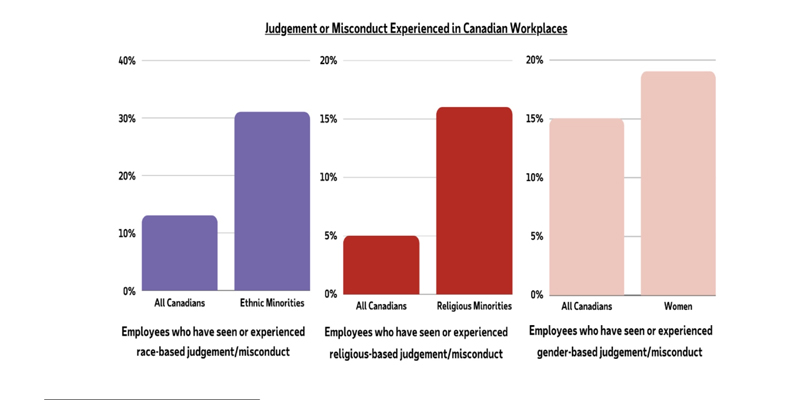Diverse voices of women and ethnic minorities in the workplace are not being heard, revealed a study from ADP Canada, the HR, talent, time management, benefits and payroll experts.
Women and members belonging to visible ethnic minority groups have reported “experiencing or witnessing more judgement, misconduct and inequality in the workplace”, according to ADP Canada. More specifically, working Canadians who belong to a visible ethnic minority reported that their ethnicity has negatively impacted their career and they experience greater feelings of discomfort in the workplace.
The study carried out with Maru/Blue reveals that Canada’s workplaces have room to improve when it comes to diversity and inclusion (D&I) issues.
DIVERSE VOICES NOT HEARD
According to the study, a quarter (25%) of working Canadians don’t feel comfortable expressing their opinions at work. Those belonging to a visible ethnic or religious minority feel even less comfortable (31% and 39%, respectively). The same is true for women in the workplace, with 27% of working women saying they don’t feel comfortable “expressing their opinions at work”.
Additionally, half of employed Canadians who belong to a visible ethnic minority believe their background is not represented within the make-up of their management team. Visible ethnic groups in Canada in the study include Aboriginal or Indigenous, Black, Afro American or Black Canadian, Asian or Asian Canadian, Arab (North Africa, Middle East. West Asia), Caribbean, Latin, Central and South America, and others.

ABSENCE OF BELONGING
“With visible ethnic and religious minorities reporting more discomfort about sharing their ideas at work, employed Canadians within these communities may not have a strong sense of belonging at work and may not feel their input is heard when trying to participate in discussions,” stated Reetu Bajaj, HR Advisor at ADP Canada. “These same individuals may also perceive that they are not represented within their management team.”
In fact, members belonging to visible ethnic minorities are more likely to state they witnessed problematic behaviours at work, revealed the study. Of those surveyed, 13% of all working Canadians agreed that they have witnessed or experienced judgement or misconduct at their current workplace based on ethnicity or skin colour. However, 31% of working Canadians belonging to a visible ethnic minority group reported such behaviours – that’s twice the number of all working Canadians.
Moreover, respondents identifying as members of visible ethnic minorities also reported negative effects on their career advancement. Around 32% of respondents believed their ethnicity had negatively impacted their career progression, and 19% said prejudice or lack of diversity and inclusion based on their ethnicity has influenced their decision to leave an employer. Looking at gender, 19% of working women reported witnessing or experiencing judgement or misconduct based on gender and 22% believe their gender has negatively impacted their career advancement.

PRIORITISING DIVERSITY & INCLUSION
However, on a positive note, the study shows that Canadian employers are making D&I a main concern, with one-in-three working Canadians (32%) stating that D&I are priorities for their organisation. When asked how D&I were integrated into the corporate culture of their organisation, Canadian workers identified composition of the workforce, onboarding and training, and surveys and employee feedback as the primary vehicles. However, 36% of survey respondents felt that while their organisation is taking steps in the right direction, D&I is still not considered a priority.
“The fact that respondents who identify as being part of the Canadian cultural majority report being less likely to experience or identify problematic behaviours in the workplace, indicates that these issues may be more widespread in the workplace than many Canadians think,” added Bajaj. “While our survey also shows that conversations have started in half of Canadian workplaces, employers must be proactive in implementing a diverse and inclusive culture within their organisations to be respectful of human rights.”
YOUNGER GENERATIONS
The report also found that younger workers are more loyal to organisations that publicly support D&I. In fact 47% of the next generation of workers (aged 18 to 34) said they would feel more loyal to their organisation if it publicly took a stand on D&I. That’s twice the response rate of the general working population (25%).

Workers aged 18 to 34 and visible ethnic minorities were the most vocal when it came to issues of D&I. Top asks from these groups include a more diverse leadership team at their organisation (30% and 32%, respectively), and more events or initiatives that encourage cultural learning and inclusivity (29% and 27%, respectively).
“There is undeniable evidence that diverse workforces support more productive and creative organisations,” added Bajaj. “With the survey indicating that the younger generation of workers is more committed to social justice in the workplace, expectations around diversity and inclusion may be heavily-weighted attributes of ideal employers as the future of work emerges.”
ADDITIONAL SURVEY FINDINGS
Further findings from the study also revealed that:
- When it comes to judgement and misconduct in the workplace, younger working Canadians are more likely to have noticed or experienced these issues (31% of respondents aged 18-34, compared to only 19% of respondents aged 55+).
- While 87% of working Canadians said prejudice or lack of D&I has never influenced their decision to leave an employer, 19% of those belonging to a visible ethnic minority said prejudice or lack of ethnic diversity has already influenced their decision to leave an employer.
- 47% of working women indicated they would leave their employer if they found an employee of the same level, but different gender, received higher compensation.






































